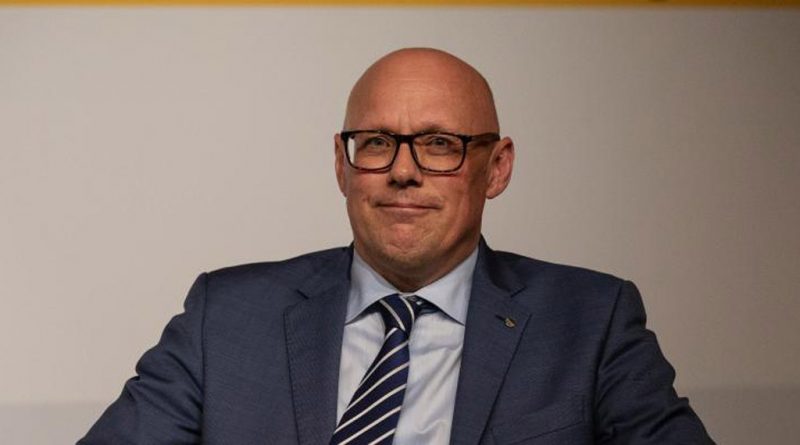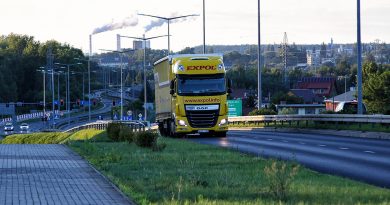Kristian Kaas Mortensen, Girteka Logistics: Tackling the European driver shortage
The challenge of the driver shortage within the trucking industry is well known. Europe is facing a growing shortage of professional drivers, and currently has barely four-fifths of the trucker drivers it needs to meet the demand. With an ageing workforce and challenges recruiting young and female drivers into the profession, the risks posed by the shortage are becoming increasingly concerning.
IRU spoke to Kristian Kaas Mortensen, Director of Strategic Partnerships at Girteka Logistics, to discuss how they’ve been tackling the problem.
IRU: Tell us a bit about yourself, Girteka Logistics and your role in the company?
– Girteka Logistics is a Lithuanian Logistics Company, founded in 1996. We conduct 460,000 full truck loads every year and we currently own a fleet of 6,000 trucks and 6,300 trailers.
I joined Girteka Logistics in early 2015, and since then I have held several roles. As Director of Strategic Partnerships, I am now a member of our group management board and focus mainly on three things: business development, keeping our biggest customers happy, and acting as Girteka Logistics’ spokesperson.
IRU: It’s well documented that the industry currently suffers from a driver shortage, how has this affected Girteka Logistics?
To tell you the truth, the driver shortage isn’t a big problem for Girteka. Today, we employ 13,000 drivers, and by the end of 2021 we will employee 20,000. As we have a turnover of around 20% a year, this means we hire at least 100 new drivers a week.
However, we are acutely aware of the driver shortage as a problem across the industry. Staff turnover within the road transport sector is high, but today some companies are facing levels of turnover as high as around 50%.
IRU: How is Girteka Logistics able to retain and attract drivers, despite the industry shortage?
– For us at Girteka, the key here has been investing in the welfare of our drivers, in particular through our driver welfare academy. We have 30 full time employees whose role is to educate drivers through the academy, and this allows us to focus our drivers on traffic safety and economical driving.
We see a huge benefit in getting our drivers to drive more economically – not only does it help reduce accidents, but it makes for a much more efficient transport if we are able to reduce fuel consumption even by just 1 litre per 100km. By encouraging drivers to think this way and not dispatching them in pressurised situations, we reduce the stress on them and improve their safety. This approach has certainly helped us to attract and retain some of the best talent in the industry.
By reducing stress on drivers, we can improve their safety and the quality of their working lives, making the profession more attractive to both those within and outside of the industry.
IRU: Do you believe there are any regulatory changes that could impact the driver shortage?
– I think the European Union’s Mobility Package could have a very positive impact on the driver shortage. By improving standards around rest time rules, safety infrastructure and access to the profession, the package has the potential to drive up the standards of working life for drivers across the continent.
IRU: How is Girteka Logistics able to use technology to protect itself against the driver shortage?
– Put simply, technology can help tackle the driver shortage by making drivers’ lives easier. Last year, for instance, we invested in a high-technology tablet for every single truck and a paired smartphone in the hands of every single driver. These devices allows them to have their tachograph data and driver identity card online, reducing the time they have to spend at checks.
Systems such as an automatic route planner, have a similar impact. This is an online navigation system that has access to traffic data and shows which routes will allow for the size of the truck being used. Then there are technologies that improve safety, such as an anti-collision braking system.
Again, by reducing stress on drivers, we can improve their safety and the quality of their working lives, making the profession more attractive to both those within and outside of the industry.
IRU: Are there any other ways in which companies can reduce stress for drivers?
Again, the answer here really lies in using technology to help make drivers’ lives easier. For example, one of the challenges drivers routinely face is managing refrigerated trays of cargo, which require specially programmed cooling units.
This is more challenging that you might think as the settings need to be very precise! At Girteka we can now programme the pre-cooling of cargo from our offices. This takes away stress for drivers and allows them to focus on what they need to do – watch the traffic and drive safely.
Kristian Kaas Mortensen will be speaking at the IRU Logistics and Innovation Forum in London on 21 February 2020. The conference will be a unique opportunity for transport operators, service providers and national transport associations to share knowledge, connect and learn about new solutions on a subject of utmost importance to the industry: safety.
Photo/Source: iru.org






